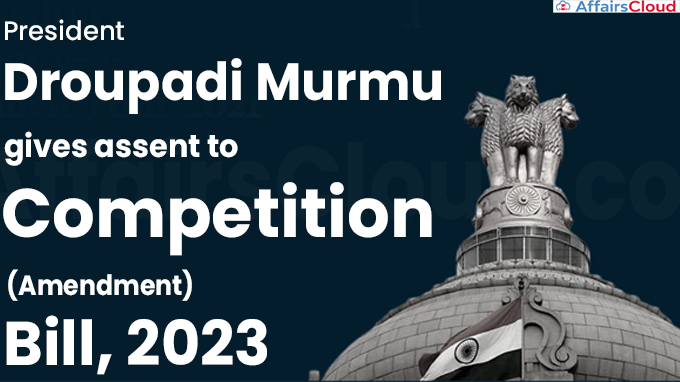 President Droupadi Murmu has given her assent to the Competition (Amendment) Bill, 2023, which aims to amend the Competition Act, 2002, that regulates competition in the Indian market and forbids anti-competitive practices like cartels, mergers, and acquisitions that might have a negative impact on competition.
President Droupadi Murmu has given her assent to the Competition (Amendment) Bill, 2023, which aims to amend the Competition Act, 2002, that regulates competition in the Indian market and forbids anti-competitive practices like cartels, mergers, and acquisitions that might have a negative impact on competition.
- This Act may be referred to as the Competition (Amendment) Act, 2023, and it will go into effect on the date that the Ministry of Corporate Affairs (MCA) “appoints” for the amended law to take effect.
- It is worth noting that the law stipulates that different dates may be chosen for certain provisions of the Act.
- The Act shall be implemented and enforced by the Competition Commission of India (CCI).
This represents the most comprehensive changes to competition law made by the Government of India (GoI).
Backdrop
i.On August 5, 2022, the bill was first introduced in the Lok Sabha (the lower house of Parliament) and referred to the Jayant Sinha-led Parliamentary Standing Committee on Finance.
- The committee submitted its report in December 2022, and the Bill was reintroduced in February 2023 with a few amendments.
ii.On March 29, 2023, the Lok Sabha approved the bill after roughly 13 amendments were proposed by Union Finance Minister Nirmala Sitharaman.
iii.On April 3, 2023, the Rajya Sabha (the Upper House of Parliament) approved the Competition (Amendment) Bill, 2023, which amends the Competition Act, 2002.
Highlights of the Competition (Amendment) Bill, 2023
i.The Competition Amendment Bill 2023 suggests a number of amendments to the Competition Act of 2002, including reducing the window for evaluating combinations, broadening the scope of anti-competitive agreements, and changing the penalties.
ii.Under the new bill, Mergers and Acquisitions (M&As) for more than Rs. 2,000 crore must be reported to the CCI, if the acquired entity has significant business operations in India.
iii.The amended law calls for the CCI to appoint a Director General (DG) [Investigation] in addition to shortening the M&A clearance timelines (from 210 days to 150 days). The DG (Investigation) has so far been appointed by the GoI.
iv.Other amendments include broadening the scope of anti-competitive agreements to encompass hub-and-spoke cartels, sellers, and sales of goods and services, as well as altering the criteria used by CCI to assess whether an agreement will significantly harm competition.
v.The bill proposes to define ‘turnover’ for the purposes of the penalty as global turnover resulting from all products and services provided by a person or an entity.
- The concept is to impose a penalty as a percentage of the global turnover of the offending company, as opposed to the existing practice of levying a percentage of the local or relevant market turnover as a penalty.
- The amendment makes sure that companies cannot move their earnings to other nations in order to avoid paying penalties for violating competition laws.
- It has introduced a 25% deposit of the penalty for appeals, which is yet another significant change.
vi.The new law also allows for the inclusion of facilitators of specific anti-competitive agreements (hub-and-spoke) within its purview.
vii.By switching from the application of fines to civil penalties, the law decriminalizes several offences of the Act.
- These violations consist of breaching CCI orders and DG directives regarding anti-competitive agreements and abuse of a dominant position.
viii.Other significant aspects include the establishment of a Settlement and Commitment Framework to ensure quicker market correction, the notion of Deal Value Threshold for alerting M&As to handle killer acquisitions in the digital market, and the introduction of a “leniency plus” regime.
- The leniency plus regime is a new technique for identifying cartels that would encourage businesses already under investigation for one cartel to disclose other cartels that are not known to the competition regulator.
Competition Commission of India (CCI)
i.The CCI was established by the Central Government with effect from 14th October 2003, is a statutory agency of the GoI tasked with upholding the Competition Act, 2002.
- It consists of one Chairperson and six Members who shall be appointed by the GoI.
ii.The commission is a quasi-judicial entity that provides recommendations to statutory bodies and also handles antitrust disputes.
Recent Related News:
i.In March 2023, the Competition Commission of India (CCI) approved the LIC Mutual Fund Asset Management Limited (LIC AMC)’s acquisition of the rights to manage and administer the schemes of IDBI Mutual Fund (IDBI MF) from IDBI Asset Management Limited (IDBI AMC).
Acquirers: LIC Mutual Fund Asset Management Limited (LIC AMC); LIC Mutual Fund Trustee Private Limited (LIC TC); and IDBI Asset Management Limited (IDBI AMC).
About the Competition Commission of India (CCI):
Acting Chairperson– Sangeeta Verma
Establishment – 2003
Headquarters – New Delhi, Delhi




